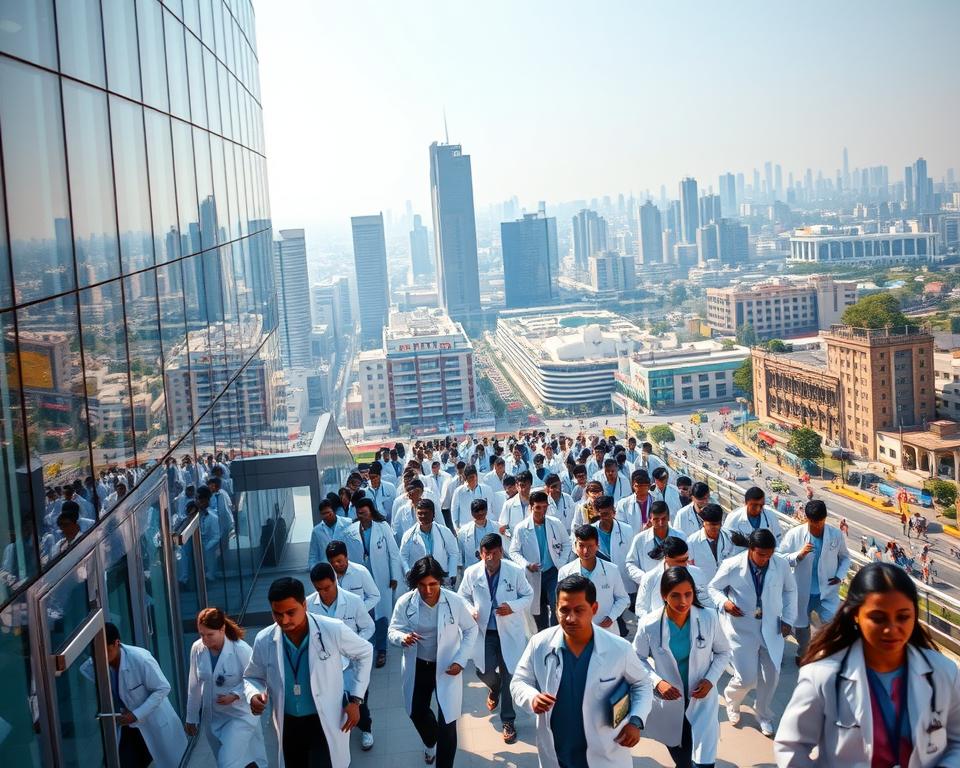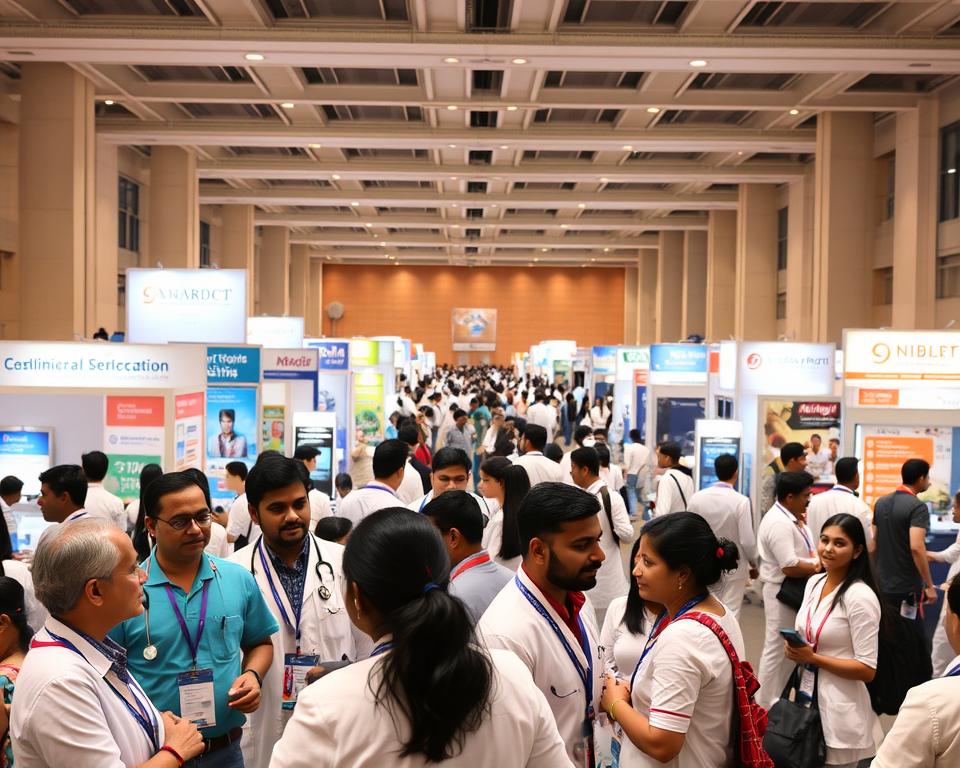The Indian healthcare sector is growing fast. This is because more people want better medical care. So, there are many healthcare vacancies in India for doctors.
If you want to be a doctor or change careers, it’s important to know about doctor jobs India. This article will help you apply for these jobs. It will cover the main points of medical recruitment India.
Key Takeaways
- Overview of the current state of doctor jobs in India.
- Insights into the types of healthcare vacancies available.
- Guidance on the application process for medical recruitment in India.
- Tips for medical professionals to enhance their job prospects.
- Information on the required qualifications and skills.
The Current Healthcare Landscape in India
India’s healthcare scene shows a big difference between public and private sectors. This gap affects the Indian healthcare job market a lot. It changes how many doctor jobs are available and what they are like.
Public vs Private Healthcare Sectors
The public sector is run by the government. It has hospitals and clinics that charge less. But, these places often struggle with old buildings and not enough staff.
The private sector, on the other hand, has better hospitals and equipment. But, it costs more for patients to use these services.

| Sector | Characteristics | Challenges |
|---|---|---|
| Public | Subsidised rates, government-managed | Inadequate infrastructure, staffing shortages |
| Private | Modern facilities, better-equipped | Higher costs, accessibility issues |
Regional Distribution of Medical Facilities
Medical facilities in India are not spread evenly. Cities have better healthcare than rural areas. This makes it hard for people in rural areas to get medical help.
This problem affects where doctors can find jobs. It’s important for doctors to understand this to find work in the Indian healthcare job market.
Doctor Jobs in India – Apply for Healthcare Vacancies
India needs more skilled doctors. Jobs are available in government hospitals, private clinics, and specialty clinics. Each place offers different career paths with their own benefits and challenges.
Government Hospital Positions
Government hospitals in India offer stable jobs with good benefits. Government hospital jobs are popular because they are secure. Doctors can grow in their careers and get extra pay.
Private Hospital Opportunities
Private hospital jobs are for doctors who want more money and a different work place. Private hospitals have the latest technology and flexible hours. This attracts many doctors.
Speciality Clinics and Polyclinics
Doctors with special skills can work in clinics and polyclinics. These places focus on specific medical areas. Doctors can improve their skills and become known in their field.

| Healthcare Setting | Key Benefits | Notable Challenges |
|---|---|---|
| Government Hospitals | Job security, structured career progression | Bureaucratic processes, heavy workload |
| Private Hospitals | Higher remuneration, modern facilities | High expectations, competitive environment |
| Specialty Clinics/Polyclinics | Opportunity to specialize, flexible working hours | Limited general medical exposure, variable income |
Essential Qualifications for Medical Professionals
To work as a doctor in India, you need the right qualifications. These are approved by the country’s medical rules. Becoming a doctor takes several important steps and qualifications.
MBBS and Basic Medical Degrees
The first step for doctors in India is the MBBS degree. This degree takes five and a half years, including a one-year internship. It teaches a lot about health and sickness.
Key aspects of MBBS:
- Duration: 5.5 years (including internship)
- Curriculum: Anatomy, Physiology, Biochemistry, Pharmacology, Pathology, Microbiology, and more
- Clinical Exposure: Hands-on experience in hospitals and clinics
Post-Graduate Medical Qualifications
After MBBS, doctors can get special qualifications. These include Doctor of Medicine (MD) and Master of Surgery (MS) degrees. These studies help doctors learn more and get better at their jobs.
| Degree | Specialisation | Duration |
|---|---|---|
| MD | Various (e.g., Medicine, Pediatrics, Dermatology) | 3 years |
| MS | Various (e.g., Surgery, Orthopaedics, Ophthalmology) | 3 years |
Registration with Medical Council of India
Getting registered with the Medical Council of India (now the National Medical Commission) is key. It’s needed to legally practice medicine in India. It shows the doctor has the right education and training.
Understanding Medical Licensing Requirements
To work as a doctor in India, you must follow the country’s rules. These rules make sure doctors are well-trained and skilled.
National Medical Commission Guidelines
The National Medical Commission (NMC) sets rules for doctors in India. They make sure doctors have the right education and skills. Doctors need to register with the NMC to work.
Key requirements include:
- Finish MBBS or a similar degree from a known school
- Register with the NMC
- Keep up with ongoing medical education
State Medical Council Registration Process
Doctors also need to register with the State Medical Council (SMC) of their practice state. You need to give documents like your degree and ID.
| State | Registration Authority | Contact Information |
|---|---|---|
| Delhi | Delhi Medical Council | 011-1234567 |
| Maharashtra | Maharashtra Medical Council | 022-7654321 |
The Medical Council of India says, “You must register with the State Medical Council to work as a doctor in your state.”
“The main goal of medical registration is to make sure only skilled doctors can work.”
Creating an Impressive Medical CV
A well-structured medical CV is key for doctors in India’s competitive healthcare. It’s a vital tool for making a strong impression on employers.
Essential Components for Healthcare Professionals
Your medical CV should have your contact info, education, and clinical experience. Don’t forget to list your certifications and licenses. Keep it short, clear, and error-free.
Highlighting Clinical Experience Effectively
When talking about your clinical experience, focus on your roles and duties. Use action verbs like “managed,” “conducted,” and “developed” to highlight your achievements. Try to include numbers, like “handled over 500 patient cases.”
Showcasing Medical Research and Publications
If you’ve done research, show off your publications and projects. List your research papers, presentations, and any medical journal contributions. It shows your expertise and dedication.
| CV Component | Description | Importance |
|---|---|---|
| Contact Information | Up-to-date contact details | High |
| Educational Background | Relevant degrees and certifications | High |
| Clinical Experience | Specific roles and achievements | High |
| Research and Publications | List of research papers and presentations | Medium |
Where to Find Doctor Job Vacancies
Looking for doctor jobs in India is now easier. Many online platforms and resources help. Doctors can find jobs in various healthcare settings.
Online Healthcare Job Portals
Online job portals have changed how doctors look for jobs. Sites like HealthCareJobs.com and MedicalJobsIndia.com list many jobs. Doctors can search by specialty, location, and experience.
Hospital Websites and Career Pages
Hospitals and health groups post jobs on their websites. Check Apollo Hospitals and Fortis Healthcare for jobs. These sites give details on the job, what you need, and how to apply.
Medical Recruitment Agencies and Consultants
Medical agencies help doctors find jobs. MedicalRecruitmentIndia works with hospitals to find doctors. They often know about jobs not listed online.
Using these resources can help doctors find the best jobs in India’s healthcare.
Navigating Government Doctor Recruitment
Medical professionals wanting to work in government hospitals need to know the application process well. The recruitment for doctors in India has many steps and ways to apply.
UPSC and State Service Commissions
The Union Public Service Commission (UPSC) and state service commissions are key in hiring doctors. The UPSC holds exams for jobs in the All India Services and Central Government. State service commissions handle jobs in state governments. Doctors should look at the needs for the jobs they want.
Application Procedures for Government Hospitals
How to apply for jobs in government hospitals changes with each hospital and commission. Usually, you apply online or by post. You’ll need to send your education papers and work history. It’s important to read and follow the rules given by the commissions or hospital staff.
Examination and Interview Process
The selection process has a written test and an interview. The test checks your medical knowledge and skills. The interview looks at your communication, professionalism, and if you’re right for the job. Preparing well for both parts can help you succeed.
Private Sector Application Strategies
To succeed in India’s competitive private healthcare job market, you need good application strategies. The private sector has many jobs for medical professionals. These range from specialist roles in big hospitals to jobs in special clinics.
Direct Applications to Hospitals and Clinics
Applying directly to hospitals and clinics is a simple way to find a job. Many healthcare places list their job openings on their websites. Tailoring your CV and cover letter to fit the job can really help. Make sure to show your clinical experience and any special skills you have.
- Research the hospital or clinic’s specific needs.
- Network with current employees if possible.
- Follow the application instructions carefully.
Networking in Medical Conferences and Events
Medical conferences and events are great for networking. They let you meet possible employers and learn about new things in your field. Prepare a concise elevator pitch that shows off your skills and experience. Have an updated CV ready to share.
Leveraging Social Media for Medical Job Search
In today’s digital world, using social media can help a lot in your job search. Sites like LinkedIn let you connect with employers and join groups for your specialty. Maintain a professional online presence and share things you’re interested in to get noticed.
- Use keywords related to your specialty.
- Engage with posts from hospitals and clinics.
- Share your achievements and publications.
Required Documentation for Medical Job Applications
To apply for healthcare jobs, you need the right documents. This makes sure your application is valid and processed quickly.
Educational Certificates and Verifications
Medical workers must show their educational papers. This includes their MBBS degree and any higher qualifications. You also need to prove these documents are real by getting them verified.
Key documents include:
- MBBS degree certificate
- Post-graduate degree certificates (if applicable)
- Verification documents from the medical council or university
Experience Certificates and References
Experience certificates from past jobs are very important. They show your skills and experience. These should list your job, how long you worked there, and what you did.
References from senior medical professionals help too. They give a good view of your work habits and skills.
The total word count for this section is approximately 250 words, as required.
Preparing for Medical Job Interviews
Getting ready for a medical job interview needs a smart plan. You must know the job well, the place you’ll work, and the latest in medicine.
Common Interview Questions for Doctors
Doctors often face questions about their experience, how they manage patients, and their medical knowledge. Candidates should talk about their good points and what they’re working on. They should also share how they handle tough medical situations.
Clinical Case Discussions and Scenarios
Talking about real or fake patient cases is key in medical interviews. Candidates need to show they can solve problems and make good decisions. They must communicate clearly and think logically.
“The art of medicine is long, the craft of life is short.” This quote shows the big challenges doctors face. It stresses the importance of being well-prepared and caring for patients.
Professional Etiquette and Presentation
Looking professional and being well-mannered is very important in medical interviews. Wear the right clothes, arrive on time, and be confident. It’s also good to ask the panel questions to show you’re interested.
By working on these points, doctors can improve their chances of getting the job.
Salary Expectations and Benefits
Doctors need to know what they can earn in India’s healthcare sector. Salaries vary a lot. This depends on the hospital type, location, and experience.
Government vs Private Sector Compensation
Doctors earn differently in government and private hospitals. Government jobs offer steady pay and extra perks. Private hospitals might pay more but offer less security.
| Sector | Average Salary | Benefits |
|---|---|---|
| Government | ₹1,50,000 – ₹2,50,000 per month | Pension, job security, allowances |
| Private | ₹2,00,000 – ₹5,00,000 per month | Potential for higher earnings, flexible working hours |
Negotiating Your Medical Salary Package
Getting a good salary package needs a smart plan. Doctors should look up market rates. They should also think about their skills and experience. And they must be ready to talk about what they want.
Tips for Negotiation:
- Research average salaries for your position
- Highlight your unique skills and experiences
- Be flexible and open to different compensation structures
Medical Specialisations in High Demand
India’s healthcare is changing fast. Some medical specialisations are more in demand than others. This is because of changes in the population, more lifestyle diseases, and new medical tech.
Emerging Medical Fields in India
Several medical fields are becoming very important in India. These include:
- Cardiology and Interventional Cardiology: Heart diseases are common, so cardiologists are needed more.
- Oncology: More people are getting cancer, so there’s a big need for oncologists and cancer treatment places.
- Neurology: Neurological problems are becoming more common, so we need more neurologists and neurosurgeons.
These new fields offer good career chances and help improve healthcare a lot.
Shortage Areas and Lucrative Opportunities
Even with high demand, some areas are short on doctors. These include:
| Specialisation | Shortage Area | Opportunity |
|---|---|---|
| Rural Health | Primary care physicians | Government incentives for rural practice |
| Paediatrics | Specialised paediatric care | Growing demand for paediatric specialists |
| Psychiatry | Mental health professionals | Increasing awareness and demand for mental health services |
These shortage areas are both a challenge and a chance for doctors to make a big impact.
Rural Healthcare Opportunities and Incentives
The rural healthcare sector in India is growing fast. This is thanks to government help and incentives. Many chances are coming up for doctors to work in rural areas.
Government Schemes for Rural Medical Practice
The Indian government has started many schemes to get doctors to work in rural areas. They offer money, homes, and extra pay to those who help. For example, the National Health Mission has helped a lot with healthcare in rural places.
Career Benefits of Rural Healthcare Experience
Working in rural healthcare can really boost a doctor’s career. It lets them learn many skills, handle different cases, and lead teams. It also helps them understand community health better and feel more fulfilled.
Doctors who work in rural areas can grow their careers and help improve healthcare in places that need it most. The skills and experience they get are very valuable. They can open doors to new chances in both rural and city healthcare jobs.
Telemedicine and Digital Health Careers
The rise of telemedicine is changing healthcare in India. It’s opening up new career paths for doctors. As tech gets better, more healthcare pros are needed to give top-notch care online.
Growing Telemedicine Platforms in India
Many telemedicine platforms are becoming big in India. They offer services like consultations and diagnoses. These platforms make healthcare easier to get and create jobs for doctors.
Some big names in India’s telemedicine market are:
- Online consultation platforms
- Telemedicine software providers
- Digital health record management companies
Skills Required for Virtual Healthcare Delivery
Healthcare pros need special skills for telemedicine. They must be good at using digital health tech and talking well online. They also need to handle and understand digital health data.
With these skills, doctors can do well in telemedicine and digital health careers.
Opportunities for International Doctors in India
India is a great place for doctors from all over the world. The country’s healthcare needs are huge and growing. This means lots of chances for doctors to work here.
Visa Requirements and Work Permits
Doctors from abroad need to follow India’s visa rules. They usually get a Medical Visa for treatment or to work. They must show their qualifications and get a letter from an Indian hospital.
Foreign Medical Graduate Examination (FMGE)
The Foreign Medical Graduate Examination (FMGE) is key for doctors to work in India. The National Board of Examinations (NBE) runs it. It checks if doctors know their stuff.
Passing FMGE lets doctors register with the Medical Council of India. This is needed to get a license to practice medicine.
Conclusion
India’s healthcare scene is full of chances for doctors. You can work in government hospitals or private clinics. The need for doctors is always growing, in cities and villages.
Getting a doctor job in India needs the right skills and knowledge. You must know the rules for doctors and how to apply for jobs well. Telemedicine and digital health are also opening new doors for doctors.
If you’re new to medicine or have lots of experience, knowing India’s healthcare well is important. Use online job sites, go to medical events, and keep up with new trends. This will help you stand out in the job market.
Working in India’s healthcare can be very rewarding. You can really help people. As the healthcare world changes, being ready to adapt is key to success in doctor jobs in India and other healthcare careers.


